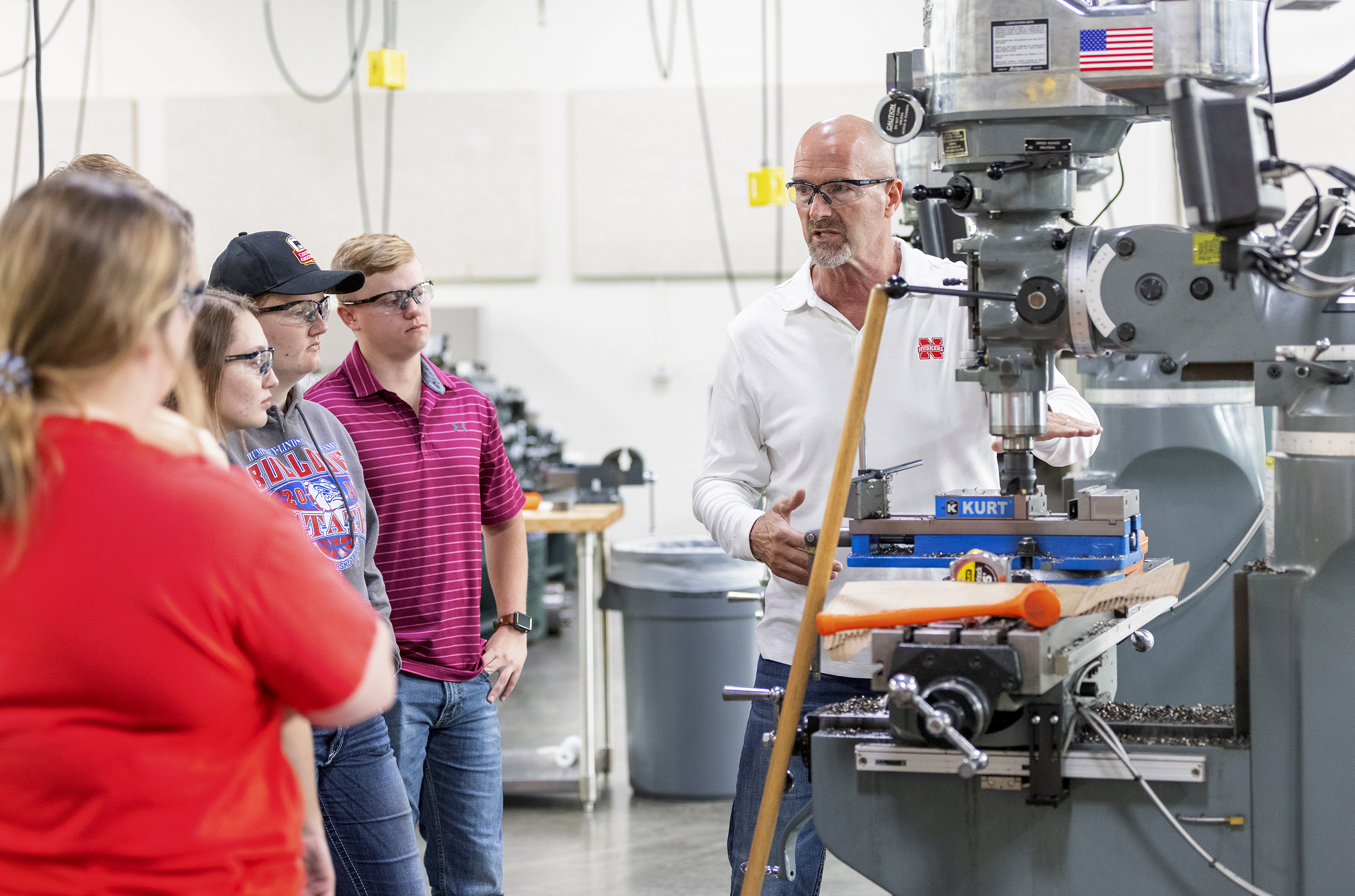
Modern agriculture increasingly depends on complex, ever-changing technology. The same applies for 21st-century manufacturing. To fill that demand, Nebraska needs a pipeline of well-trained workers — and a pipeline of capable teachers to provide students with technology-focused instruction.
Eric Knoll, an associate professor of practice with the University of Nebraska–Lincoln’s Department of Agricultural Leadership, Education and Communication, has pioneered a range of strategies to meet those needs.
Knoll heads ALEC’s Skilled and Technical Sciences (STS) teacher training program, and his innovations have strengthened instructional curricula and facilitated partnerships with industry, Nebraska community colleges and the state’s Department of Education. Under his leadership, the STS program has garnered increased financial support from industry for internships and scholarships and expanded students’ experiential learning opportunities on the shop floor and in the lab.
Knoll has pursued a statewide vision, helping STS students fill teaching positions not only in Lincoln and Omaha, but in communities across the state. He has worked with industry and partner institutions to strengthen programs that enable mid-career professionals in technical fields to become STS teachers in Nebraska.
The Association for Career and Technical Education has honored Knoll for those achievements by naming him its Postsecondary Teacher of the Year for Region 5, a 16-state region that includes high-population states such as California, Washington and Colorado. Knoll is under consideration for the association’s Postsecondary Teacher of the Year honor, to be announced in November.
Knoll’s program trains prospective STS teachers in a range of technical fields, including welding, plumbing, robotics, construction, electrical wiring, precision machining, computer/machine tool programming and automated manufacturing.
“I appreciate Eric’s willingness to try new ideas, especially with educator training,” said Sydney Kobza, assistant director for career and technical education with the Nebraska Department of Education. “He asks great questions and provides insights into how something could work.”
Kobza pointed to Knoll’s effective collaboration with her department on two projects. The Technical Skills workshops are a summer program helping educators strengthen their technical skills in the classroom. As part of that effort, Knoll “piloted a reading comprehension lesson and focus to these workshops to help with reading strategies in the classroom,” Kobza said.
In addition, Knoll collaborated with the Department of Education on the JumpStart teacher training program. Training sessions held over four days help educators with career education permits and assist mid-career Nebraskans’ transition to STS teacher positions. The program focuses on lab management and safety, classroom management, career field resources, and lesson and unit planning.
Before joining the Husker faculty, Knoll taught industrial technology for 24 years at Lincoln High School and then worked as the district’s curriculum specialist for the STS program for seven years.
“Eric’s demeanor and patience make a strong teacher educator,” Kobza said. “Eric can break down different processes for individuals to understand and do it in such a way to help the individual learn. He sees the big picture and highlights the components, such as how to manage a crowded lab safely in order for effective instruction to occur.”
Nebraska’s community colleges are a key partner for the university’s STS program, Knoll said, given their focus on close communication with industry and meeting companies’ needs.
“Having that relationship in the 2+2 Program is such a benefit to those students,” he said. “They’re coming out with the latest techniques and technologies in the industries they’re exposed to.”
It’s important that young people understand that 21st-century manufacturing companies “are not the old manufacturing of the 1950s,” Knoll said. “They’re doing things that are innovative, amazing and creative. So, these future employees are not just going to be sitting in a welding booth smelling smoke all day long. They’re going to be doing a lot of different things,” and in a lot of cases “working with robots that assist in the welding and manufacturing of products.”
Knoll’s leadership in working with five Nebraska community colleges through the 2+2 articulated program has enabled seamless academic transitions for students between institutions, said ALEC head Mark Balschweid. Knoll stands out for his diligence and effectiveness in helping students address their individual needs, said Balschweid, a professor of agricultural education.
“A central tenet to the cohesion and success of this transfer program has been the one-on-one advising that Eric provides to every student as they begin and progress through their community college program,” Balschweid said.
Effective teaching requires not only knowledge, but dedication, Knoll said.
“Teaching is not for everyone, and it’s not an easy profession,” he said, “but when you love what you do and you can impact your community and change the lives of kids, there’s not much else that’s more satisfying than that.”








